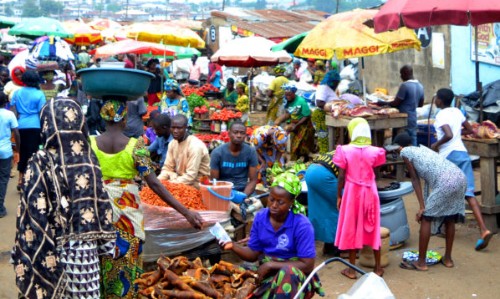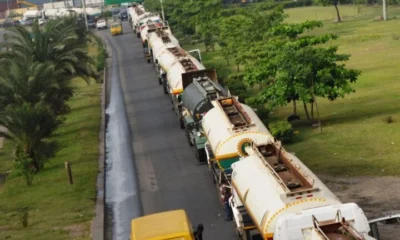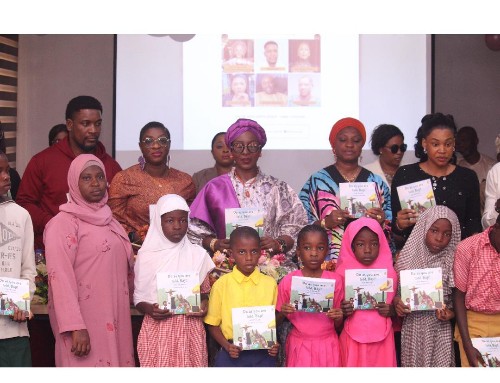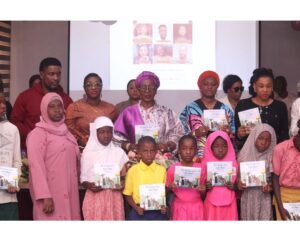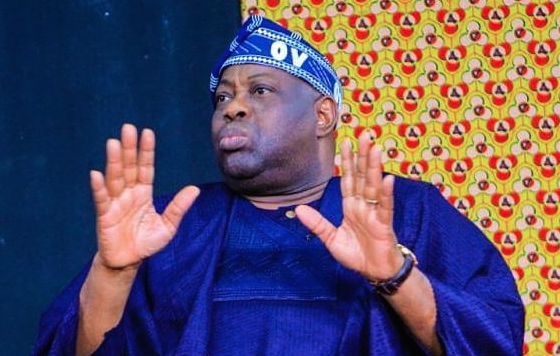About a week to Christmas Day, shoppers have condemned the worsening naira scarcity, with many of them expressing frustration over their inability to make vital purchases for the Yuletide celebration.
According to The Punch, banks were still rationing cash over-the-counter, while several Automated Teller Machines visited did not dispense cash.
Visit to ATM galleries in Lagos, Abuja, Osogbo, Makurdi, Sokoto, Edo, and Gusau, among others, showed that many of the machines had run out of cash.
On Friday, many bank customers could not get access to cash OTC in many baking halls across the country.
This was despite assurances from the banking regulator, the Central Bank of Nigeria, that more cash had been released for economic activities.
According to The Punch, many poultry sellers and local stores were insisting on cash as a means of payment for their goods.
A roadside trader in Abule Egba, Lagos, who simply identified herself as Mama Sule, told one of our correspondents that “many customers who want to buy onions are saying they don’t have cash. I don’t have a bank account, so I can’t accept transfers; sadly, It is affecting my business.”
Also, another trader in Olowoira, Lagos, said, “I am still insisting on cash for payment because I have experienced failed transactions before. If you have cash, I will sell to you.”
A Christmas shopper, Remi Arowolo, said, “I was traveling from Abeokuta to Lagos, I saw cheap tomatoes on the road and when I stopped to buy, they said they could not accept transfer from me; they insisted on cash. I wanted to buy them in large quantities ahead of Christmas, but I could not buy them.”
Also, a Point of Sale operator in the Mokola area of Ibadan, Oyo State, who simply identified himself as James, said, “I cannot get enough cash for my business; my business is suffering. I am not making a profit and Christmas is near, no money to spend this Christmas. It is sad.”
However, some sources in the bank who would not want to be named, said the banks could only give out cash if they had.
A top bank official of one of the commercial banks said, “We are still rationing cash to customers, but if the cash supply increases, we will give out. We don’t have enough even for our ATMs. Maybe if the CBN released more cash, we should have more.”
Observations revealed that numerous ATMs in Abuja on Sunday were not dispensing cash to customers.
The ATM galleries belonging to GTBank, Zenith Bank, Stanbic IBTC and UBA located along Airport Road did not dispense over the weekend, although security officers at the facilities said the cash had been withdrawn by some customers.
In the Ojodu area of Lagos, one of our correspondents visited ATMs belonging to First Bank, EcoBank, Union Bank, Access Bank, Zenith Bank and GTCO, on Ogunnusi Road; none of the ATMs had cash on Sunday.
Some bank customers, who were around the ATMs, expressed frustrations for their inability to get cash.
On Sunday, customers at a branch of Sterling Bank along Ikotun-Idimu Road were seen stranded as the bank’s ATM did not dispense cash.
One of the customers who did not want her name mentioned, said, “We have been here for a long time now, and the ATM didn’t dispense. I am not the only one here, we are more than five. I wanted to collect some cash to enable me to transport myself to my house in Ayobo, but this is not dispensing. I don’t know what happened.”
Another customer who simply identified himself as Harry, said “This is frustrating, coming back from church, I decided to stop here and get some money to buy some items for the week but the ATM is not dispensing. I had visited some other banks, but the ATMs were not dispensing cash.
According to The Punch, a visit to a Zenith Bank branch on the same stretch revealed that though there was little or no queue at the bank, the ATM was not dispensing.
Also, when one of our correspondents visited the Guaranty Trust Bank at Omole Phase 2, Olowora, Lagos, it was discovered that none of the five ATMs at the GTBank branch was dispensing cash.
The security officer who resumed on Sunday afternoon said he met the ATMs empty.
However, customers were able to make e-payment transfers with the machines. Some of our correspondents observed how two customers used the facility for e-transfers.
Mrs Esther Akinbo, a businesswoman in the Ojodu area of Lagos said that there was severe scarcity of cash over the weekend, a situation that hampered her Christmas shopping.
As a result, she said she could not make vital purchases ahead of the Christmas and New Year celebrations.
She said, “I don’t go to ATMs because my card has expired but that has never been an issue. But since last week, cash seems to have dried up and customers are no longer paying in cash and prefer to do transfers, so it has now become a problem.
“I have also minimised my cash spending, but I hope we don’t see a repeat of the scarcity issue we had early this year. The painful part is that I couldn’t get cash to shop for Christmas too. I need things for Christmas for my family,”
Another Christmas shopper, who identified himself as Mr Tunde Ogunde, condemned the cash scarcity, saying the situation had marred his preparation for Christmas.
“I believe we should do something about the cash scarcity, it has become worse. Poultry sellers and many petty traders are insisting on cash, which is affecting Christmas shopping.
At the Bwari Area Council of the FCT, the ATMs did not dispense cash.
Most banks available there comprising of First Bank, Zenith Bank and Polaris did not have cash in their machines.
- 100% PoS Charges Increase
The cash crunch made point-of-sale operators increase their service charge fee by at least 100 percent.
Findings showed that N200 was collected as a service charge for withdrawals of N5,000, and below, N400 for N10,000, N800 for N20,000, N1,300 for N30,000 and so on.
When asked the reasons for the price hike, a PoS operator, identified as Kunle Idowu, said it was the option to keep his business afloat as he had to source for cash from traders and market sellers.
He said, “On Friday, I went to the bank so, I could have enough cash for my customers during the weekend but to my surprise, the bank said, they could only give me N10,000 over the counter. What do you want me to do?
“I had to start begging traders and market women to help out. I have to keep the business afloat too, so the CBN and government should ensure that there is sufficient cash.”
A resident in Isheri, Lagos, Dupe Leke, said, “People now patronise the PoS operators who charge 100 percent of the previous charges on withdrawal.
“For instance, at a PoS stand, N5,000 now costs N200 against N100 in the months preceding the cash scarcity.”
Many Nigerians have opted for bank transfers to make payments for goods due to the prolonged scarcity of naira.
Traders, who spoke to our correspondent, said they preferred cash payment to bank transfer due to the high bank transfer scams recorded earlier in the year.
A trader, who sells food items, said, “Even though I accept bank transfers, I am afraid of the possible rise in the number of bank transfer scams that happened earlier in the year. So, I look at my customers well before I accept a transfer.”
A Lagos resident who spoke with our correspondent on condition of anonymity said, “I mostly use electronic payment and it has been hassle-free, no hike in the charges.”
At the World Bank, Nigeria Development Update, December 2023 edition, the Governor of the Central Bank of Nigeria, Yemi Cardoso, said that the prevailing cash scarcity was a result of the poor implementation of the naira redesign policy, which had resulted in hoarding by some Nigerians.
The CBN boss, acknowledging the glaring defects in various CBN policies, announced a comprehensive review initiative.
He said, “The apprehension surrounding the policy’s end date, well before the third quarter, triggered widespread hoarding. Many feared the old notes would lose legal tender status, prompting them to hold onto their cash.
“Unfortunately, the history of that lies with the naira redesign policy and coming to the end of the year, way before the third quarter, there was a lot of apprehension with respect to where this was all going to end; and whether the old currency would no longer be good for legal tender and many started hoardings.
“This is really what happened. Happily, the Supreme Court has decided that the currency will be valid post-end of the year.”
Also, the CBN said the amount of cash in circulation currently stood at N3.4tn.
A statement by its acting Director, Corporate Communications, CBN, Mrs Hakama Sidi-Ali, said, “There is indeed an increase in currency in circulation. From N1tn in February 2023, we have seen a rise to over N3.4tn as of December 11, 2023. This demonstrates that enough cash is available, but unfortunately, it’s not circulating due to apprehension among some individuals.”
Naira scarcity has hit Makurdi, Benue State capital and environs as queues surfaced at the ATM gallery since Saturday.
Consequently, banks have limited the amount customers can withdraw.
A Point of Sale man, who simply identified himself as Julius, told our correspondent on Sunday, “I went to the bank yesterday, (Saturday) to withdraw money, but there was a long queue and the highest amount you can withdraw at FirstBank if it is your bank was N40,000 with your ATM.
“But if it is a different ATM, the highest amount customers could withdraw was N20,000.00.”
As a result of that, Julius said that the commission charged by POS had doubled since Saturday.
Commercial activities were at a standstill in Gusau and other parts of Zamfara State following the naira scarcity experienced by the people of the state.
Checks showed that the ATMs were not dispensing money to customers, while POS operators were charging exorbitant fees.
POS operators were charging N300 for every N10,000 withdrawal due to the cash crunch.
In Benin, Edo State, there was a scarcity of cash with ATMs in major banks not dispensing more than N20,000.
The POS operators, who had cash, were having a field day as they charged exorbitant commissions for cash withdrawals.
POS operators in Minna, the Niger State capital, lamented that Deposit Money Banks had started rationing cash to them, which had forced them to also ration it to their customers.
A female operator, Hauwa Abdullahi, said that there was an obvious shortage of cash in the banks and ATMs were not dispensing cash.
Abdullahi said, “Banks have started experiencing a shortage of cash as the ATMs are not functioning properly. While the bankers are eager to collect from those depositing, they are reluctant to pay people withdrawing in full.”
Another operator, Timothy Nnadozie, expressed surprise that the cash crunch came up after the Federal Government had directed that both the old and new naira notes should be in use simultaneously and indefinitely.
“I can’t understand what is happening in the country. Only last week, the Federal Government directed that both the old and new notes should be accepted by Nigerians. Why are we not seeing enough money in circulation?” he asked.
PoS in Rivers State have cried out over the scarcity of cash in the state. They said the banks were limiting their withdrawals, making it difficult for them to satisfy their customers.
A PoS operator, who gave her name simply as Sarah, said, “Even now, some ATMs in some banks were dispensing cash. If you visit a bank to withdraw N100,000, they will only give you N50,000, and it is not enough for us.”
Observations revealed that the number of ATMs dispensing cash in banks had reduced.
Many ATMs at different commercial banks within Osogbo metropolis, on Sunday evening, were not dispensing cash.
Specifically, at the FirstBank branch, Ayetoro and Wema Bank, Igbona, in Osogbo, ATMs were not dispensing cash when our correspondent visited them on Sunday.
A bank worker, who preferred anonymity while commenting on the situation, said that the Central Bank f Nigeria, Osogbo Branch had not been giving cash to commercial banks in the state in recent time.
“We rely solely on deposits from customers for cash in the last few days and people are not depositing cash lately. CBN is not giving commercial banks cash. If you move around Osogbo, most ATMs are not dispensing cash. It is because CBN is not giving banks cash,” he claimed.
In Gombe, residents have been battling with naira scarcity as most ATMs have not been dispensing cash.
Confirming the challenges of most residents, Danladi Bako said, “I went to one of the commercial banks, but I couldn’t make a withdrawal from the ATM. So, I had to enter the banking hall. It took the assistance of a member of staff before I got just N10,000.”
Also, another resident of the state, Godiya Iliya, noted that many customers prefer to transfer, adding that “In fact, getting money from POS operators has been difficult. They claimed there was no cash. Many customers just use their ATM cards or do transfers to buy things. When you ask them why, they claim, “No money on the ground’.”
Despite persistent assurance by the CBN on the availability of cash in circulation, residents of Sokoto and Kebbi States have been complaining of cash scarcity.
Our correspondent observed that most of the bank ATMs in the states were not dispensing cash throughout the weekend.
Also, many of the POS in the states had run out of cash as few of them who had cash got it from filling stations or their relatives in the market.
Credit: The Punch

 BIG STORY5 days ago
BIG STORY5 days ago
 BIG STORY3 days ago
BIG STORY3 days ago
 BIG STORY4 days ago
BIG STORY4 days ago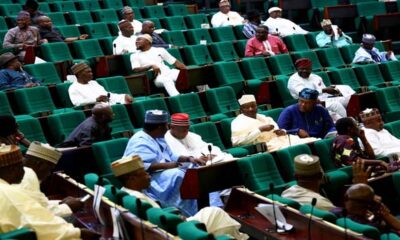
 BIG STORY4 days ago
BIG STORY4 days ago
 BIG STORY3 days ago
BIG STORY3 days ago
 BIG STORY17 hours ago
BIG STORY17 hours ago
 BIG STORY17 hours ago
BIG STORY17 hours ago
 BIG STORY3 days ago
BIG STORY3 days ago




